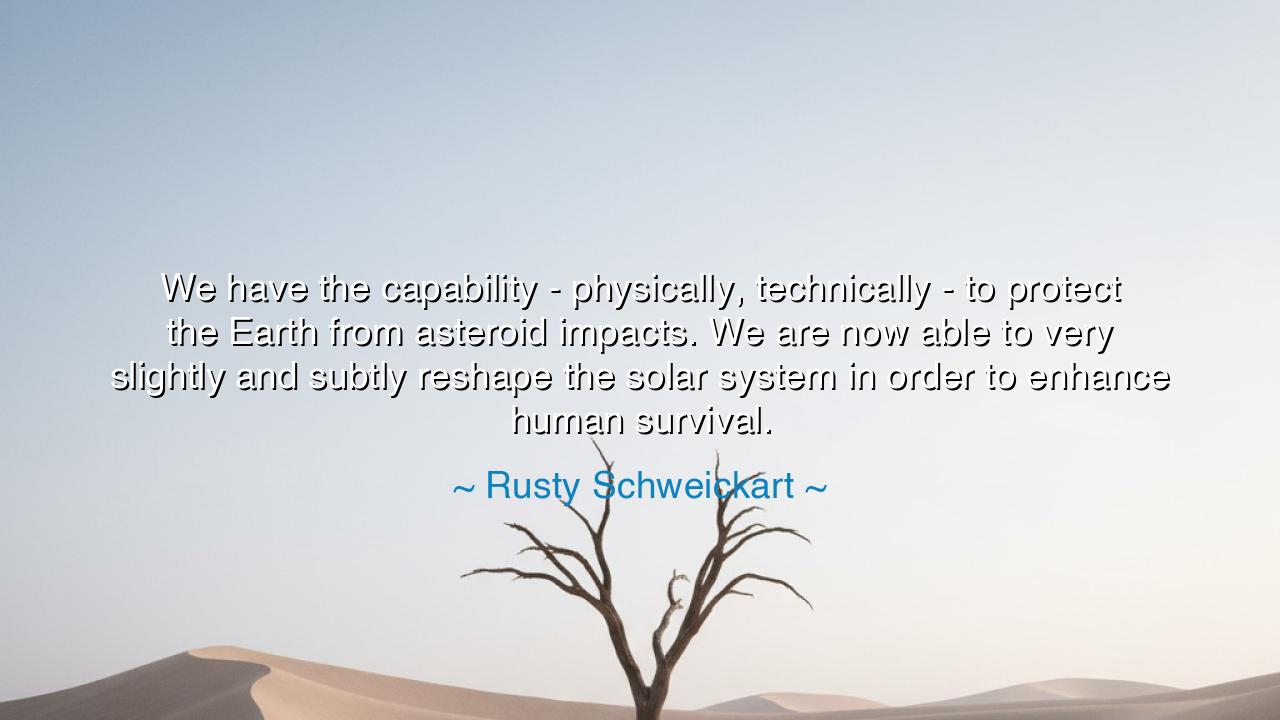
We have the capability - physically, technically - to protect the
We have the capability - physically, technically - to protect the Earth from asteroid impacts. We are now able to very slightly and subtly reshape the solar system in order to enhance human survival.






"We have the capability—physically, technically—to protect the Earth from asteroid impacts. We are now able to very slightly and subtly reshape the solar system in order to enhance human survival." These words, spoken by the visionary Rusty Schweickart, speak to a profound truth: that humanity, through its ingenuity and determination, has reached a moment in history where it can now influence the cosmic forces that shape its existence. The very forces of nature, which once seemed beyond our reach, are now within our grasp. In this moment, we stand on the precipice of a new era—one where the survival of the Earth and its inhabitants may no longer depend solely on chance or the mercy of the cosmos, but on the strength and wisdom of human action.
For millennia, humanity has gazed up at the sky in awe and wonder, aware of the vastness of the universe and the vulnerabilities it carries. Ancient peoples looked to the heavens, believing them to be the domain of gods and forces beyond their control. The Greeks, with their stories of the gods and titans, saw the heavens as a realm where fate was decided, where men had little say in the events that shaped their lives. The great Plato and Aristotle pondered the nature of the cosmos, yet they, like all men of their time, believed that the forces of nature were absolute and beyond human influence. The heavens were seen as distant, untouchable. But today, we stand in a new light, where the technology of the modern world offers us a chance to alter those very forces.
Schweickart’s statement reveals a shift in human understanding and capability. In the age of exploration, we journeyed to distant lands, seeking to tame the earth itself. In the age of science, we have set our sights beyond the Earth, into the great expanse of space, where, for the first time, we have the ability to protect our world from celestial dangers—specifically, asteroids. The threat of an asteroid impact is not a new concern. Histories of the Earth are punctuated by such catastrophic events, like the mass extinction of the dinosaurs, whose demise was believed to have been caused by a giant asteroid striking the planet. Yet, in our age, we now have the tools—the physical and technical capabilities—to deflect such threats. We are no longer passive observers of the universe but active participants in shaping our fate.
Consider the history of space exploration. The Apollo missions of the 20th century were a testament to humanity’s ability to reach for the stars. In 1969, Neil Armstrong and Buzz Aldrin walked on the Moon, forever changing our perception of what was possible. Their achievement was not merely a triumph of technology but a reflection of human resilience and vision. Armstrong’s first steps on the Moon were symbolic of humanity’s desire to expand beyond the known world, to venture into the great unknown. But the ability to reshape the solar system, as Schweickart suggests, represents an even greater leap—one not of exploration alone but of protection, of actively ensuring that humanity can continue to thrive in the vastness of the cosmos.
Yet, this capability comes with a great responsibility. With the power to alter the solar system, to shift the orbits of asteroids or other celestial bodies, comes the obligation to wield that power with wisdom and care. Just as the ancient kings and rulers wielded their power over their kingdoms, often with good intentions but sometimes with disastrous consequences, so too must we be mindful of the consequences of our actions in space. The power to protect Earth from asteroid impacts is a great gift, but it is also a delicate responsibility, one that must be guided by a commitment to stewardship and balance.
In our own lives, we too must recognize that with great capability comes great responsibility. We may not have the ability to reshape the orbits of planets, but we do have the power to reshape our own world. Our actions today—whether they are in the realm of technology, environmental stewardship, or social progress—will shape the future of humanity. Like the great explorers before us, we stand at a crossroads, able to change the course of history. But it is the wisdom with which we wield our powers that will determine our legacy.
Therefore, take this wisdom to heart: as we continue to explore, innovate, and shape the future, we must do so with a sense of humility and responsibility. The very forces that sustain life on Earth—whether they be the gravitational pull of the planets or the care of the natural world—are fragile and interconnected. Just as we have learned to protect our world from cosmic dangers, let us also remember that we are responsible for the care of the Earth itself. Stewardship is not just about protection from the unknown but about nurturing what is known, tending to the Earth, and guiding its future with foresight and care. Only then will we truly honor the gift we have been given—the chance to shape our world, both in space and on Earth.






AAdministratorAdministrator
Welcome, honored guests. Please leave a comment, we will respond soon